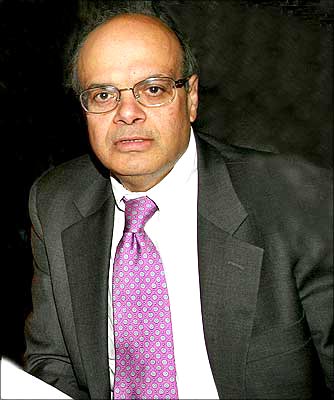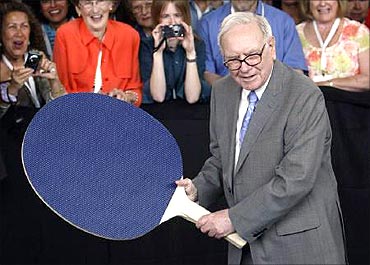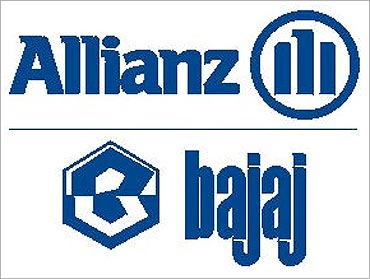Photographs: Reuters
With his boss on an India visit, he speaks to the NDTV Profit television channel.
Edited excerpts:
Does that (high praise from Buffett) act as a constant pressure to outperform?
It does in ways in which you want to live up to the expectations that people have for you, and it doesn't because he's one of the few bosses who does a very good job in distinguishing between outcome and decision-making before the event happened.
The way the world works is, it looks at outcome and you may have made a good decision but which ends up in the bad outcome and everyone comes down like a ton of bricks, but by the same token, on the flip side, you might make a bad decision, but comes out with the good outcome and you get all the glory under the sun.
Warren does an incredible job in de-coupling the two, and measuring people in terms of the quality of decisions that were made before you know the outcome.
...
'We want first-hand feel of market'
Image: Warren Buffett sets clear guidelines, says Jain.Photographs: Reuters
You have got the reputation of taking the biggest risks, almost a gambler's appetite. Warren, on the other hand, always says you are very disciplined.
The fundamental aspect of risk taking is to be able to assess what are the odds of something bad happening to you, and being able to define how bad is bad. You don't need more than high school algebra to be able to handle that and then to make sure you get paid, so that you have a margin of safety.
We at Berkshire have an advantage, as there is nothing forcing us to riding risk if we don't feel it is adequately priced.
So, we have a single-minded focus on making sure we can assess the risk and if we can't, we just say pass. If we can, we get a price that adequately compensates us for risking our capital.
...
'We want first-hand feel of market'
Image: Size of Indian market makes it attractive, says Jain.Photographs: Reuters
The projections are that in the next four-five years, this will be the third-largest economy in the world, other than the US and the China. So, clearly, the size of the market place is what makes it attractive.
The market is growing at a phenomenal rate, capital is pouring in and there are businesses that are flourishing. The country is democratic and does have the rule of law and we are certainly hoping that in the next few years, we end up finding the right opportunities, so that we can deploy a significant chunk of capital in this part of the world.
Do you feel stymied that the markets are not open for reinsurance in India?
Our approach is, you tell us what the rules are and we play by the rules. We may not like the rules but that's life. That there are constraints in terms of caps on foreign ownership is certainly an issue in setting up an insurance company in India.
In terms of reinsurance, it's not that much of a constraint and our operating system in the US can serve the Indian market as a reinsurer from US.
...
'We want first-hand feel of market'
Image: Alliance with Bajaj Allianze is an important step.Photographs: Reuters
As a result, we are not riding as much of business as we'd like to. Hopefully, that would change.
Our portfolio in India is $20 million and as that market keeps growing, we are in a state of readiness to do 10 times more. Once again, we don't have a specific target, our approach is see the opportunities as they come up and take one step at a time.
Is the business venture with Bajaj Allianz anything more than dipping your toes in the Indian market?
It is a small step but an important step and what it leads to, we have no preconceived notion. I hope it leads to something big, fairly quickly. But it gives us a chance to have a presence in India.
To get a first-hand feel for the opportunities, both from the perspective of the customer in terms of unmet needs and in terms of the government restriction, in terms of the legal structure and the legal set-up.
So, when the right set of opportunities present themselves, we will be better positioned to move and act rapidly.
..
'We want first-hand feel of market'
Image: Jain says his views on charity have changed.Photographs: genxfinance.com
I love my job and I hope I keep doing it for a long time. I don't think about the legacy. I just hope I don't do something stupid. I have had fun with what I have done in 25-26 years and I hope I keep doing it for as many years as I'm allowed to keep doing it.
Buffett, in India, said people should give. Do you personally follow that, in terms of charity, give away personal wealth?
A difficult and personal question and my views have changed somewhat over time. We have a son who's been diagnosed with a serious illness and before he was diagnosed, I was in favour of the Buffett philosophy. I always felt I have got this fame, this wealth, I didn't deserve, it doesn't belong to me. But after my son's illness, things did change. I didn't deserve this and he didn't deserve what he is getting.
So, in terms of my giving, without getting into too much of details of how things have changed, one, we focus on the Foundation that's trying to find a cure for his illness.
Second, I feel guilty, inasmuch as in his earlier life when he was healthy, I wouldn't let him spend money and have a nice time. So, I have taken a U-turn and now I spend a lot of money and freely.








article